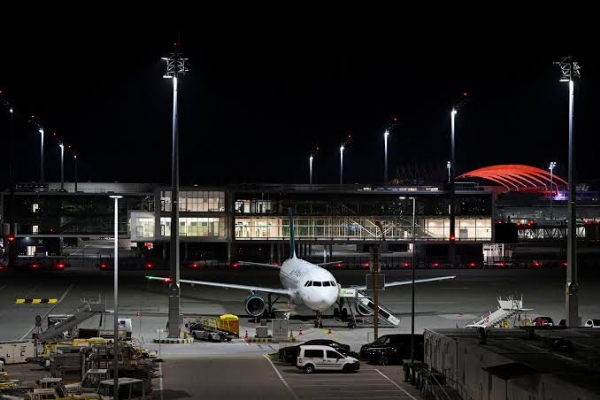
Munich, October 4(HS): Munich Airport was compelled to halt operations for the second straight night after reports of unverified drone sightings near its airspace, leaving thousands of travelers stranded while authorities scrambled to assess the threat.
The shutdown came exactly 24 hours after a similar incident on Thursday, which saw more than 30 flights canceled and nearly 3,000 passengers left in limbo as both runways closed for several hours. Police helicopters were deployed, but officials said they lacked details on the type or number of drones involved, deepening the uncertainty.
The airport provided camp beds, blankets, drinks, and snacks for affected travelers during the unexpected overnight halt. While air traffic resumed by 5:00 am Friday, several outbound flights later that evening were canceled, delayed, or diverted as authorities remained on alert amid persistent safety concerns.
The disturbances marred Germany’s Unity Day celebrations and the final weekend of Munich’s famed Oktoberfest—a period of peak tourism that has already faced disruptions after a bomb scare earlier in the week.
Europe on Edge Over Drone Incursions
The incidents in Bavaria reflect a broader trend across Europe, where Denmark, Norway, and Poland have all temporarily closed airports following encounters with unidentified drones. Romanian and Estonian officials have suggested Russian involvement, though Moscow has dismissed the allegations as unfounded and accused European allies of “hysteria” to justify increased defense spending.
German Interior Minister Alexander Dobrindt described the Munich events as a “wake-up call,” calling for accelerated investment and research into counter-drone technologies. Bavarian premier Markus Soeder demanded new laws to allow police and military to “shoot down drones immediately instead of waiting,” as legislative proposals in Berlin seek to grant exactly such powers.
Growing Calls for a “Drone Wall”
Fears of escalating aerial incursions have brought fresh scrutiny to Europe’s defenses, with Ukrainian President Volodymyr Zelensky warning that recent close encounters signal a potential escalation in Moscow’s tactics. In response, European officials are advancing regional defensive agreements—popularly labeled the “drone wall”—while accepting international anti-drone technology offers to safeguard sensitive meetings.
NATO, too, has intensified vigilance along the Baltic region after Denmark activated anti-drone defenses provided by the US.
As Munich weighs the balance between public safety and operational continuity, the episode casts a spotlight on the evolving challenges of drone surveillance in European airspace and the urgent policy responses required to address them.
---------------
Hindusthan Samachar / Jun Sarkar








